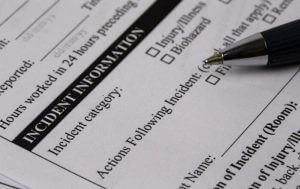Written By:
 Salvatore Nuzzo
Salvatore Nuzzo
Your Dedicated & Trusted Legal Team
3 Generations & 100+ Years of Combined Legal Experience

You’ve been in an accident and you want to file a claim with your insurance company. There’s no way to know at first how much compensation you could get. But there are a lot of things you can do to make sure you get every dime that you deserve. Very few claimants adhere to every piece of advice below, but the more a person sticks to these guidelines, the better their chances of getting fair payment.
1. Record everything from the day of the accident.
Naturally if you’ve been injured, your top priority is getting medical attention. But if you have the ability and the wherewithal, photograph, and video record everything. Any smartphone has a good enough camera for this. Take note of the time and place, weather, road condition, and the points of impact on each vehicle. You are going to need this information throughout the course of your claim. In fact, it will become the foundation of the claim.
Most claims don’t settle right away; they may go into litigation and then settle months, if not years later. Attorneys—whether for the claimant, the defendant, or the insurance company—usually push to go into deposition to test the credibility of the opposing party. Having a record of these details will help you consistently retell them to others each time you are asked about the day of your accident.
2. Know who you interacted with at the scene.
In addition to capturing the scene, write down the names and contact information for all the people you talk to and note what you said to them. Consider video recording or audio recording any conversations if you can (get consent first). The goal is to establish facts from the date and time of the accident.
You want to get the names and contact info of the drivers, any witnesses, the officer(s) on the scene, the EMT first responders, even the ER staff if you can.
3. Keep a record of what others said at the scene.
In addition, keep track of what everyone says to you. A lot of times drivers will have an exchange in the immediate moments after a crash. The other driver may come out and say, “Oh, man! I didn’t see you! I thought I had a green light.” Right away this person is establishing that they are not clear on the facts, and that can work in your favor.
This is especially important if that same driver later tells the responding officer that you ran a red light, for example. Now you have something to dispute such a statement. If you talk to any witnesses, also record what they tell you.
Sometimes you get a police report and what you told the cop isn’t in the report. If you have an audio or video recording of your statement, you can get the police report changed or even dispute the report altogether.
Keep in mind, if you were seriously hurt and you weren’t able to get the contact info for all the parties involved, or if you simply didn’t think of it at the time, you can get them from the police afterward. Police should have a record of every person they spoke to, including other drivers, passengers, witnesses, and even EMTs. If the police won’t give them to you (although they usually do), they will certainly give them to an attorney representing you.
4. File a claim with your insurance even if it wasn’t your fault.
You might be hesitant to go through your insurance company if you aren’t at fault. You may be hoping to avoid a premium increase. But this would be a mistake for three reasons. Firstly, the laws in New York and New Jersey prevent your rates from increasing for an accident where you are not at fault.
Secondly, your insurer has your back more than you think. You pay your insurance company a premium for coverage, and part of that coverage includes the obligation to investigate your claim whether you are at fault or not. You want them to do their job, so contact them.
Thirdly, the insurance provider for the party carrying the most responsibility has to pay the bulk of the claim. If you don’t file a claim with your insurance company, and the other company finds you 40% at fault, you are only going to get reimbursed for 60% of your eligible compensation. Had you worked with your own insurance provider, you might have been found only 20% at fault, or perhaps not at fault at all.
5. Be consistent with your facts.
People tend to overestimate their ability to remember things. This is why recording details are important. If you told the police that the sun was in your eyes that day, you can’t tell the insurance provider that it was overcast and you could see just fine. The more you change your story, the less credible your testimony is going to be. Get your story straight and stick with it. It’s better to be honest and accept 20% of the blame than come off as dishonest, which could give the other party leverage to put, for example, 40% or 50% of the blame on to you.
6. Keep a pain journal.
If you were hurt in an accident, start a journal recording all of your symptoms starting from the moment of the accident, and continue making entries throughout the life of the claim. How bad was the pain initially? How was your mobility in the immediate aftermath? Record any pain experienced every day on a scale of 1 to 10. Perhaps you felt fine initially and turned down medical assistance (you might have been in shock), but when you woke up the next day, you were in agony. Also keep track of what helped ease the pain: Heat or ice? Stretching or resting?
You need this for the same reason as mentioned above—to be consistent with your facts every time you give a statement or deposition. You want to give someone a hard time trying to claim you are not as injured as you say you are.
Also, remember that a claim can include money for pain and suffering. If you have a detailed record of just how much pain you were in, that helps support your testimony, becomes a record of fact, and can potentially increase any compensation you are entitled to.
7. Keep accurate medical records.
Every doctor visit, every medication, and every physical therapy appointment should be recorded. This is about more than just copays and out-of-pocket expenses—it’s about time, inconvenience, and a major change in your way of life. The more detailed the picture of your medical treatment following the accident, the better your argument for compensation.
It’s not just about time either. Maintain an accurate chronology of treatments and any progress or regression as it happens. This is as much for your claim as it is for your benefit: Such detailed descriptions can help your medical providers determine the effect of each treatment, and they can adjust them as needed.
8. Beware of gaps in your medical records.
Let’s say you had immediate pain symptoms and went to the ER, then the doctor identified a soft tissue injury, gave you Tylenol, and sent you home. There’s no gap there. However, if you do nothing at first and then, 10 days after an accident, you see an attorney and the attorney sends you to the chiropractor, now you have a gap. The defendant’s attorney is going to ask if you went to the doctor because you needed medical treatment or because the attorney asked you to go.
9. Avoid inconsistencies in your medical treatment and records.
In my career, I’ve seen oddly inconsistent medical records. One person went to the chiropractor three days in a row. Then he didn’t go for two weeks. Then he went every other day for a week. Then again three days in a row. There’s no rhyme or reason to this. It’s a red flag for any insurance adjuster.
If you’ve got your documentation in order—including a journal of your pain levels—you could back this up and explain a seemingly odd regimen. But it may be worth your while to establish a consistent treatment plan that can be clearly understood by anyone looking at it.
10. Be honest about your medical history.
This again has to do with credibility. Let’s say you have neck pain after an accident, but you had pre-existing herniated discs and other issues. If you avoid telling anyone about it, someone will probably find out and argue that your pain is not the result of the accident. So hiding it will come back to bite you and weaken your claim.
The reality is, if you had problems with your neck prior to the accident, you want to focus on identifying the last episode and treatment prior to the accident. Maybe the last time the doctor prescribed a painkiller and you were fine for another year. But since the accident, that treatment no longer works, or you need a longer regimen. You could be what we call an “eggshell victim.” That means you had an injury that was managed and the accident exacerbated it, requiring more intensive treatment. You used to go to the chiropractor once a month and now you have to go twice a week. This is fair game to be compensated, but only if you were honest about the underlying condition.
11. Know your work history before and after the accident.
There are three things here you need to keep track of. The first is a comparison of your working hours and wages before and after the accident. Compare the amount of time you took off due to doctor visits before and after the accident, for example. If you were missing a lot of time before the accident, you’ll need to account for this or else risk losing compensation.
The second thing to keep track of is how steady your work was before the accident. Did you have trouble keeping jobs? Did you file any workman’s comp claims in the past? Were you unemployed for a long period of time between jobs? You want to be able to adequately explain these kinds of things. Otherwise, it may look like you are trying to “play the system” and will damage your credibility.
The third thing is you want to think about what kind of a worker you are. An attorney can interview coworkers and bosses when investigating your claim. Are you a worker or a gamer? Do you do the bare minimum or are you a hustler? Your work ethic becomes a stand-in for your overall personality and credibility.
12. Ensure your public activities match your health claims.
I once had a claim where the person came into the courtroom in a wheelchair. However, we had a video of him playing a softball doubleheader, which we played for the court. I also once had a woman who said she couldn’t walk more than one block but was seen hiking an Appalachian trail.
So don’t tell your insurance adjuster you can’t lift more than five pounds and then go around carrying a gallon of milk home from the supermarket (which weighs about eight pounds). Don’t tell your insurance company you have a hard time standing up and then get caught playing soccer with your kids. If you are going to identify limitations, make sure they are honest and real limitations.
13. Be mindful of what you tell (and do with) friends and family.
As a rule of thumb, keep matters of your health vague among family and friends until the claim is fully resolved. You don’t want to go to Thanksgiving and brag that you just rode five miles on your bike the other day—even if that’s a sign of significant recovery that you want to share. Taken out of context this information could be used against you to harm your credibility.
If anyone has any information that is material to the claim, they are fair game for a deposition. If an insurance adjuster or attorney discovers you went on a vacation for a week with a cousin or friend somewhere, that person observed your activity and your wellbeing for a week. His or her observations and testimony would be relevant and material to the claim. He or she may be asked, what did the claimant do all week? Lay around at the hotel? Go zip-lining or water skiing?
This applies to electronic communication too. Emails and texts can be requested by defense attorneys and scoured for anything that can discredit you or call into question your credibility.
14. Watch what you post on social media.
When I mentioned being mindful of your public activities and conversations, this applies to social media as well. People need to know that social media is an open, public forum. Anything posted can become part of a record. I have a friend of mine whose sole job is to do social media searches on claimants for opposing attorneys. Some investigators will go so far as to monitor accounts of your friends and family to see if there are posts, conversations, or photos that undermine claims of injury.
Final Thoughts
The best way to wrap this up is to identify the two most important factors in a claim: honesty and accuracy.
People can’t successfully challenge what can be supported by facts and medical experts. Accuracy is also difficult to challenge.
I strongly suggest carrying around a notepad or using the notepad function of your phone to keep track of things. Too many people rely on memory. If you try to answer off the top of your head the kind of questions an insurance adjuster or attorney might ask you, there’s a good chance you could forget, or misremember something. These inconsistencies are what will be used to lower or even deny your claim.

 Salvatore Nuzzo
Salvatore Nuzzo
About The Author
Salvator Nuzzo has spent more than 30 years as an insurance adjuster for various major insurers. Throughout his career, he has handled an estimated 8,000 claims.
Read MoreLatest from Our Blog



Editorial Standards
Rosenblum Law is committed to delivering informative content of the highest quality. All content is subject to our rigorous editorial standards for relevance, accuracy, sourcing, and objectivity. Everything is fact-checked by an editor and reviewed for legal soundness by one of our practicing attorneys prior to being published.
How to Cite Rosenblum Law’s Article
APA
Salvatore Nuzzo (Jan 13, 2022). These 14 Mistakes Can Sabotage Your Accident Claim. Rosenblum Law Firm, https://rosenblumlaw.com/14-mistakes-that-can-sabotage-your-accident-claim/
MLA
Salvatore Nuzzo "These 14 Mistakes Can Sabotage Your Accident Claim". Rosenblum Law Firm, Jan 13, 2022. https://rosenblumlaw.com/14-mistakes-that-can-sabotage-your-accident-claim/
